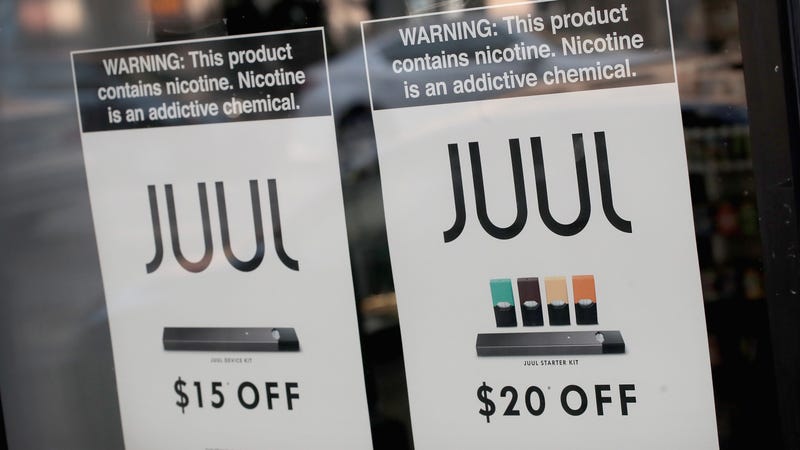 An for Juul’s e-cigarette pods, including those flavored. Photo: Scott Olson (Getty Images)
An for Juul’s e-cigarette pods, including those flavored. Photo: Scott Olson (Getty Images)
The vaping industry looks set to undergo a seismic shift in how it sells and markets its products, starting with its biggest U.S. player, Juul Labs.
On Tuesday, the San Francisco-based company announced that it would stop selling a majority of its flavored vaping products in retail stores. It also plans to shut down several social media accounts created to promote their products. Both decisions were made to curtail the popularity of vaping among teens.
According to their announcement, as of this morning, the company has stopped accepting orders for its Mango, Fruit, Creme, and Cucumber flavors from more than 90,000 stores in the U.S. The flavors will be still sold through the company’s online store, but the company says that customers will have to undergo an age and identity verification check before being approved to buy them. To prevent others from buying the products in bulk and selling them elsewhere, customers will also reportedly only be able to purchase a certain amount of pods and devices per month. The company will, however, continue to sell two tobacco-flavored pods, as well as Menthol and Mint flavors—flavors also legally available in traditional tobacco cigarettes—in stores.
The company will also tamp down most of its social media presence by getting rid of its Facebook and Instagram accounts. It will remain on Twitter, but the account reportedly won’t be used for promotional purposes.
“We don’t want anyone who doesn’t smoke, or already use nicotine, to use Juul products,” the company said in its announcement. “We certainly don’t want youth using the product. It is bad for public health, and it is bad for our mission.”
Juul’s decision didn’t come without its share of arm-twisting, though.
The Food and Drug Administration has been particularly vocal (and occasionally cringe-inducing) in its efforts to stop teen vaping as of late, following years of skyrocketing rates of usage among middle school and high school students. A large part of that effort has involved cracking down on retailers that illegally sell e-cigarettes to minors, but the agency has also warned e-cigarette companies, including Juul, to cut it out with the kid-friendly marketing of their products. Most dramatically, in September, the FDA conducted a surprise inspection of Juul’s offices, seizing thousands of company documents related to its “sales and marketing practices.”
Juul’s announcement seems auspiciously well-timed to head off a rumored decree by the FDA planned for later this week that would ban some flavored products from retail stores altogether. The company struck a conciliatory tone with the agency, however, claiming in its announcement that it and the “FDA share a common goal—preventing youth from initiating on nicotine.”
Juul actually isn’t the first company to take these sorts of steps. In late October, the tobacco company Altria announced it would discontinue most of its flavored e-cigarette products, the New York Times reported. Given that Juul has captured close to 70 percent of the e-cigarette market in the U.S., according to Bloomberg, though, its decision is sure to send large ripples throughout the industry.
But there’s still the question of whether these actions are too late, too little, according to Sven-Eric Jordt, an anesthesiologist and cancer biologist at Duke University who has studied the potential health risks of flavored e-cigarettes.
“Over the last two years, unfettered sales of Juul created a new population of nicotine-addicted youth. While the announced action by Juul is a step into the right direction, Juul has become a generic brand for most middle, high schoolers, and college students, synonymous with the whole E-cigarette category,” he told Gizmodo via email. “Active social media marketing may not be necessary to maintain a high market share for Juul, especially since competitors have removed their products and viral marketing remains strong. FDA needs to monitor whether a secondary market will form for legally purchased products to be sold to minors and if nicotine addicted youth will indeed quit or choose other tobacco products to maintain their addiction.”
It might not be the end of flavored e-cigarette products on store shelves, either. In its announcement, Juul left open the possibility of retail orders restarting if stores invested in technology that would restrict sales to people over the age of 21, including point-of-sale tech that would verify a person’s age through their government-issued ID. Altria has also stated that it would consider selling flavored e-cigarette products again, though only after getting FDA approval.
Meanwhile, the FDA’s crusade against nicotine isn’t likely to stop at vaping. This past weekend, the Wall Street Journal reported that the agency is looking to eventually ban menthol-flavored tobacco cigarettes as well.
[Juul Labs]
Share This Story